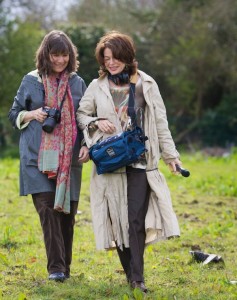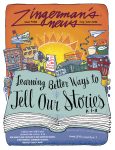Five Questions for the Kitchen Sisters
A HEARTWARMING AND COMPELLING VIRTUOSITY
I recently emailed the Kitchen Sisters asking for a quick interview prior to their upcoming visit to Ann Arbor. I try to do this with all the featured speakers of the ZingTrain Speaker Series (Wednesday, June 3, 8am) and when it goes well it’s an irresistible sneak preview to the actual session.
(Note: You can also see the Kitchen Sisters at the Camp Bacon Main Event, Saturday, June 6, 8am at Cornman Farms!)

Assuming they were busy traveling to find and produce brilliant stories, I emailed them the questions in advance. I was surprised when Nikki Silva answered promptly and set up a time to speak on the phone. Surprised and a little intimidated. The Kitchen Sisters interview people for a living! I think I’d been secretly hoping that they’d just answer over email.
I am so very glad they didn’t. What ensued was an hour of brilliant conversation. An encounter with heartwarming, compelling virtuosity. Within the first 10 minutes of our conversation, and before any of my questions had been addressed, I found myself telling Nikki Silva bits of my life story. Over the course of the hour, I also told her about my desires for the future, the origin of my name and how I spent my childhood summers. How did this come about? It came about because of Nikki’s warm voice and her lovely, brilliant questions. Her questions were the kind that gently hold doors open so you can happily, almost absent-mindedly wander in. And wander in I did.
I tell you this not just to share the sheer pleasure of being in that conversation but also to tell you that the doors led to a wandering, meandering conversation. We did eventually answer all the questions I had asked but we didn’t quite follow the sequence and enchanted novice that I was, I didn’t quite take the best notes. So I certainly hope that you plan to join us for the Kitchen Sisters Speaker Series session so you can experience the real thing.
Gauri Thergaonkar: Do you believe the art of storytelling is a lost art?
Nikki Silva: No. No I don’t. You just told me your story. I understand exactly why that question gets asked but I believe storytelling permeates everything we do. It is how we do everything. How we learn. How we connect. How we remember. Yes, the internet craves sound bytes but people crave stories. From real people. It’s just part of who we are. It’s in our being.
I believe we are trying to re-learn storytelling. If the art of storytelling is lost it is because the dinner table is lost and the dinner table used to be the training ground for stories. I live in co-housing with 2 other families. When we had meetings about our co-housing, we would fight. So we don’t have them any more. We talk at the table. It works. The stories come to the table. And we find ourselves eventually coming to agreement because we all have to come back to the table!
The table is the magnet. If anything, the table may be what is getting lost. Extended families are getting lost. We now have nuclear families and we don’t have the same rambling conversations at the dinner table.
But I also feel that people are trying to find communities and create communities. You are creating a community with your Speaker Series. We are part of a pop–up magazine and when tickets go live 3000 tickets are sold in the first 10 minutes – without people knowing the theme or the presenters! People want to connect. People want to get together physically.
Good stories remind us of who we are. Where we came from. Storytelling is the first thing we do when we go somewhere and meet someone new. We try to figure out their stories. And we try to tell them ours.
Gauri: How do you think the art of storytelling has transformed because of how we communicate now? In other words, do you think the nature of storytelling has changed?
Nikki: We have to seek out stories now because they are not as easily available.
I do believe that the nature of storytelling has changed. I tend to tell stories the old fashioned way. When I was growing up stories were a little more winding, little side routes and tributaries. They are slicker now. And everyone wants you to get to the point sooner. Perhaps people have become a little more impatient. They want to know the point right away. It’s less organic and more constrained.
It brings to mind the Southern storytellers. Still languorous. You find yourself listening to so many different stories but they somehow weave them all into one. In some ways, storytelling now is more about the hook and less about the lure. What I am always seeking is the back story. The story behind the story.
Gauri: In your mind, what is it that makes something a story? A beginning, a middle, an end, a hook?
Nikki: It’s all got to be there. The beginning, the middle, the end, the hook. Surprise works. Something unexpected keeps us listening. But most of all it has to feel like the real thing. The richness and texture of the real thing. You have to be able to feel the details. Storytelling needs to convey an entire experience so make it an experience. Use tone of voice. Use music to carry the story. Take the time to build it up. Lure me in. Don’t hit me with a punch – that’s what we lose in the soundbites. The richness of the experience.
Gauri: How did you come around to applying storytelling in a business context?
Nikki: I don’t think we consciously said businesses should know this too. It happened organically because so many of the stories we were encountering were these creation myths. We were encountering these people who were so passionate about their businesses and products.
And hearing those stories in their voices and words – it was so great. So intimate. The story of the George Foreman Grill. The story of the woman we met who told us over dinner that her father had invented the Frito. We talked to her until 2 in the morning! The story of the woman who inspired the creation of Rice-a-Roni. We’ll be playing some of those stories at the Speaker Series.
If you look at the way we do business now, the marketing has become so constrained and formalized. A prescriptive lists of do’s and don’ts. Websites are a good example. In the early days of websites, they actually reflected who we were. They were a little mirror but now they are all the same and just follow the rules.
Gauri: So, how do you come up with a great story?
Nikki: A lot of it is listening. Being present. Spend lots and lots of time with people. Let the stories unfold. Stories beget stories (That’s one of our commandments of Storytelling. We’ll present all of them at the Speaker Series).
Then, when you’ve listened and listened and listened, extract the story like a good espresso. For the radio show, sometimes we’ll talk to people for 3 days and then condense it into a 6 minute story and the people we spoke to will tell us that we represented everything they said.
That’s a good story.
See you soon!




Zingerman’s Art for Sale